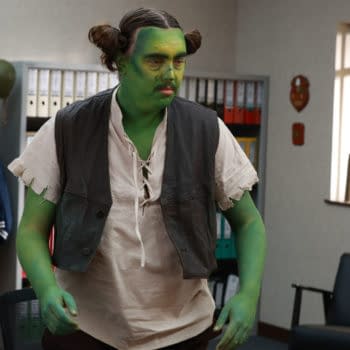Posted in: TV | Tagged: chinese science fiction, Liu Cixin, Science Grandma, streaming, TenCent, The Three-Body Problem
The Three-Body Problem Episode 13 Review: Science Grandma Begins
In Tencent's The Three-Body Problem Episode 3, the narrative moves (somewhat) along as the origin story of Science Grandma resumes.
Episode thirteen of The Three-Body Problem is unlocked for free streaming, so time to recap and review. Yes, the show is insanely faithful to Liu Cixin's book, following its basic structure, including having Ye Wen Jie, aka Science Grandma's origin story, in the middle of the story as it was originally serialized in China (and completely censoring the harsh and unflinching portrayal of the Cultural Revolution and her father's death). Since the show's pace is still slow, we might as well just go over what's going on. Maybe it's so viewers not used to Science Fiction can understand exactly what the issues are before the plot takes off. That might make sense. Anyway.
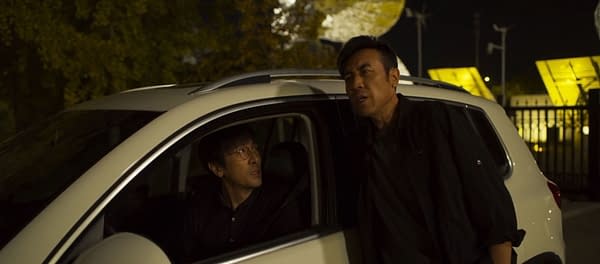
The Story So Far
Wang Miao (Edward Zhang) believes the answers lie in the Three-Body Problem VR game. Shi Qiang (Yu He Wei) is still convinced Ye Wen JIe (Chen Jin) is still the key to the whole mystery and tells Wang Miao to keep talking to her and see what he can get her to spill.
Cracks in the Frontiers of Science continue to show. Shu Yi Fei (Li Xiao Ran) objects that Pan Han (Johnny Zhang) and his people have been too extreme in their actions with acts of terror and assassination. Pan Han thinks her faction is too soft. She brings up their "commander" for the first time and asks if they would approve of his actions. He scoffs and says the commander is the one who started it all in the first place.
Meanwhile, Mu Xing (Yang Rong) has become thoroughly indoctrinated by Pan Han. Shi Qiang is astute enough to notice that her environmental reporting has become increasingly anti-science instead of asking questions about holding companies or polluters to account or addressing what can be done. She doesn't even notice, though she's running her own game by approaching Shen Yi Fei.
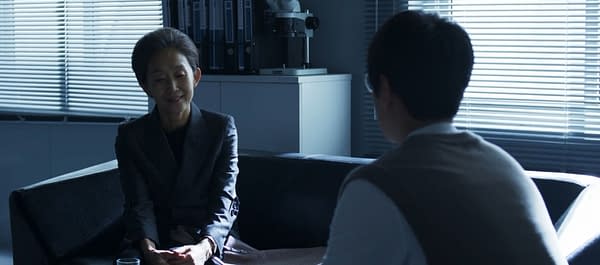
Tea with Science Grandma
Wang Miao invites Science Grandma to a tour of the nanotech lab before sitting down to tea with her. It's very Confucian, showing respect to an elder in the field as he develops his bond with her. He asks her for a list of books on astronomy he wanted to consult for solving the Three-Body Problem game. She tells him in her time; they had to fill in an application to be allowed to read books like that. He says things are certainly better now – you can just look up the books on the internet. Wang asks her about how she ended up at the Red Coast base, the top-secret observatory whose files are still classified, and we get more of Ye Wen Jie's story.
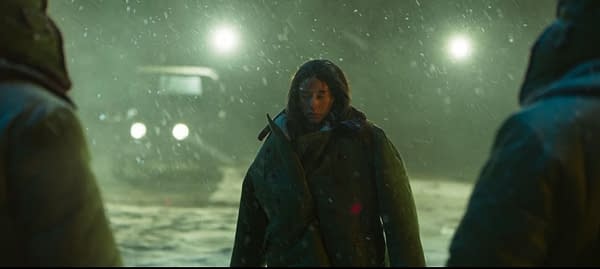
The Red Coast, at last
When we last left Ye Wen Jie, she woke up in an Army helicopter heading to parts unknown. She's still on the helicopter, overhearing an uptight Political Commissioner Lei Zhi Cheng (Zhang Fan), arguing with a man she recognizes: Yang Wei Ning (Tu Song Yan), a former student of her father's, now some kind of scientist bigshot if he can argue with a political officer and get the guy to back down. Yang argues that he needs Ye because he read her paper on astrophysics, and she's exactly what she needs for their understaffed project at Red Coast… whatever that project is.
When they get to Red Coast, Commissioner Lei tells Ye she has an opportunity to take a position at Red Coast, but if she steps through the gate, she might never leave it. This is instead of the ten-year prison sentence she would have gotten for her trumped-up sedition charges. Yang warns her that she might end up spending the rest of her life here. Ye doesn't hesitate and steps right on through. She's fine with spending the rest of her life here. Anything's better than dying from starvation, hypothermia, or torture at an internment camp. The show manages to avoid mentioning that millions died of starvation during the Cultural Revolution, and nobody knows how many people died in the purges.
When Ye enters the facility, she sees the scale of the operation and the sheer massiveness of the place. This is a show where locations do much of the heavy lifting to show its epic scale and makes it look like a really expensive production when in fact, the budget for the entire series was a bit over US$10 million, which is half the cost of one episode of House of the Dragons.
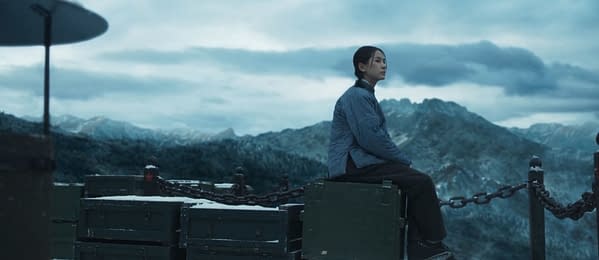
Temporary Peace
Yang may have saved Ye Wen Jie's life not just because he needs her skillset or a sense of obligation to her father but because he might genuinely care about her. Tu Song Yan subtly shows this in his performance, the way he furtive glances at her, Yang's concern for her at every turn, going out of his way to join her on her morning walks up to the peak of the observatory just to hang out with her. He might have been into her since he first met her at her parents' house years ago. Love and infatuation are often a mystery even to the lovers. He knows she doesn't trust anyone at this point – anyone could turn her in for sedition. It's life or death for her, and him, and everyone in that era, really.
For now, they have the view of the mountains.
Why "The Three-Body Problem" Matters
If you're wondering why we're reviewing The Three-Body Problem, it's because we think it matters. Just because hardly anyone in the West is paying attention to it, it's still a major cultural event. It's an adaptation of one of the most ambitious Science Fiction books of the century, it put Chinese Science Fiction on the map, and it shows that major culture isn't just created by Hollywood or Netflix.










